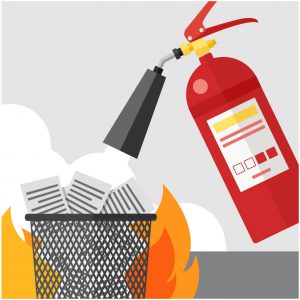How to Detect and Extinguish a Class A Fire (Paper / Wood)

What is a Class A fire?
Class A fires, also sometimes known as ‘ordinary combustible’ fires, involve solid materials of an organic nature, such as wood, paper, cloth, rubber and plastics which do not melt. This class of fire is commonly used in controlled circumstances – such as for a bonfire or camping stove – and, when created, maintained and monitored carefully can be a great source of heat and light.
However, in less restricted environments, Class A fires can very quickly grow and develop, resulting in fires which are out of control and require extinguishing techniques. They are immediately recognisable due to what is burning in the fire (flammable solids) and this can be detected due to the presence of ash. Accidental Class A fires are often found in commercial or public-access environments which feature lots of paper or textiles – such as an office, school or retail outlet. They are also one of the main causes of fires in the home and usually feature ignition sources such as matches, cigarettes, candles, lighters and heaters.
How do you extinguish a Class A fire?
Class A fires, like all fires, start and burn to the principles of the fire triangle (heat, fuel, oxygen) and, in this case, the solid materials involved provide the fuel which maintains the fire. Therefore, to put a Class A fire out, the heat needs to extinguished or the source of oxygen eliminated.
As such, one of the best and most effective ways to extinguish a Class A fire is to use water. This will cause the fire to cool down and eventually go out, stopping its spread or development in the process. This can be done by spraying the burning matter with water (such as a hose or sprinkler system) or using a water fire extinguisher.
Additionally, an alternative way to extinguish a Class A fire is to remove the oxygen content, which then ‘smothers’ the fire. Foam fire extinguishers and powder fire extinguishers are suitable for tackling Class A fires as they suppress the flames, suffocating them as a result, and stop the fire scattering and reigniting.
How do you avoid Class A fires?
The simplest, and most obvious, way to prevent Class A fires occurring is to identify and manage any organic materials in your environment which may burn, removing them from any possible sources of ignition. For example, piles of waste should be placed as far away as possible from sources of ignition and paper, textiles and wood should be similarly kept away from things which may start a fire.
Request a Callback
Just fill in your details below and we'll get back to you as soon as we can!

About Scutum London
Scutum London is a leading expert in fire safety and security solutions for businesses and organisations located across South East England, including London and Surrey.
From fire alarms, fire extinguishers and fire risk assessments to access control, CCTV and intruder alarm systems – and a lot more besides – we offer a comprehensive range of products and services designed to keep you, your business and your staff and visitors safe.
With decades of industry experience to call on, we’re proud to hold accreditations from leading trade associations and bodies such as British Approvals for Fire Equipment (BAFE), the British Fire Consortium, the Fire Industry Association (FIA) and Security Systems and Alarms Inspection Board (SSAIB).
If you’d like to find out more about Scutum London, get in touch with our friendly team or explore our products and services on our site.

